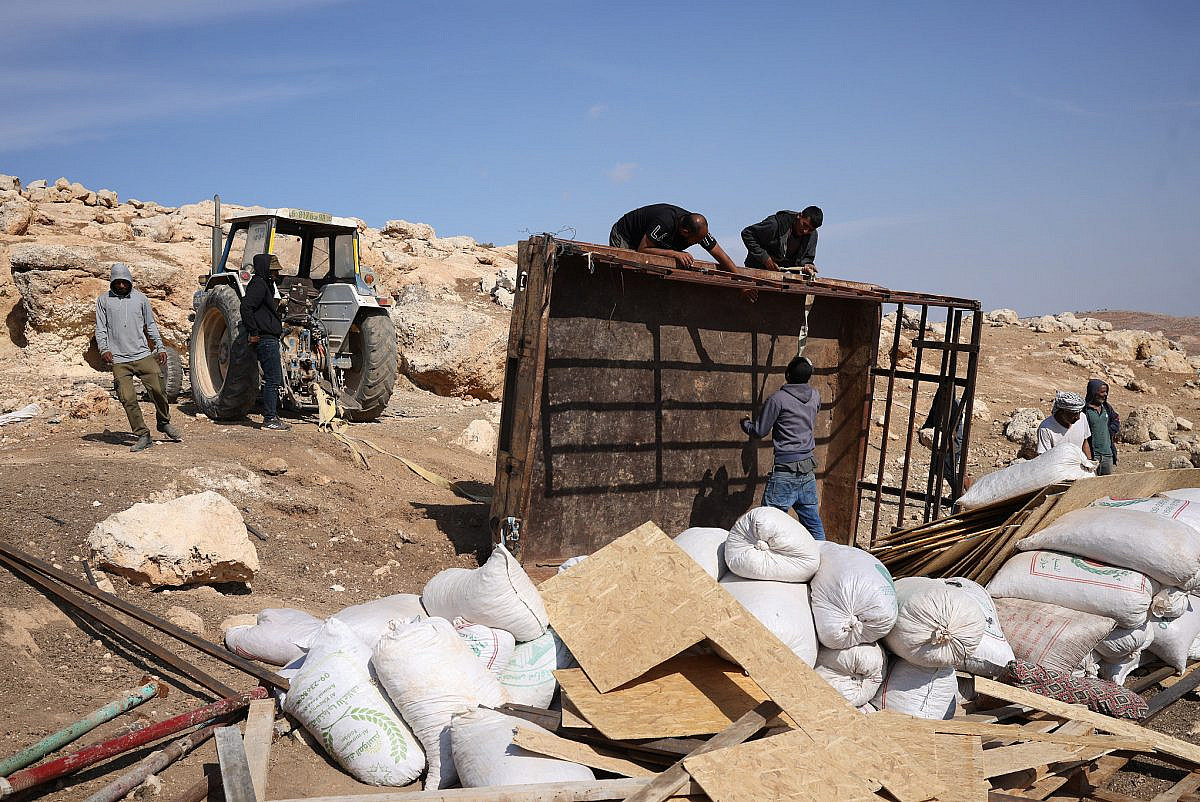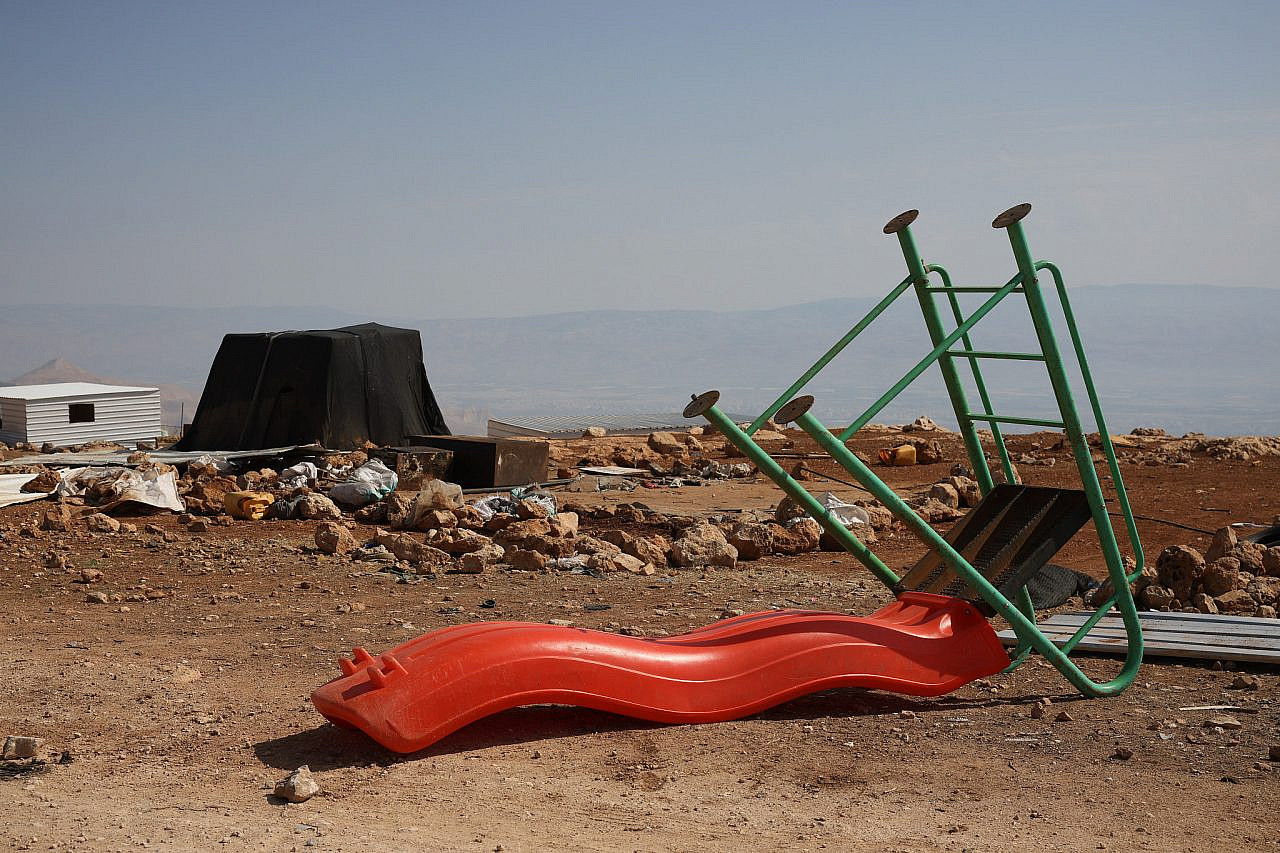While most Israelis are busy mourning the massacres carried out by Hamas earlier this month, and local and international media are focused squarely on Gaza and southern Israel, settlers in the occupied West Bank are stepping up their efforts to forcibly displace Palestinian herding communities in rural areas. According to data collected by the human rights organization B’Tselem, over 850 Palestinians — including at least 13 entire communities, as well as dozens more from an additional five communities — have been forced to flee their homes across the West Bank since Oct. 7.
Settler violence and Israeli state pressure had already forcibly displaced three Palestinian communities earlier this year, as revealed by +972 in August, and three others in the past two years, according to B’Tselem. As a result of this concerted process of ethnic cleansing — carried out through the establishment of outposts and the forcing out of shepherds from their traditional grazing lands, and exacerbated by daily violence — a vast area stretching east from Ramallah to the outskirts of Jericho has now been completely emptied of Palestinians, while isolated communities elsewhere are under greater threat than ever before.
One of the communities expelled from this area in recent days is Wadi al-Siq, one of a handful of villages where, for several months, left-wing activists (Israelis and internationals) had been maintaining a 24-hour “protective presence” due to the intensification of settler attacks aimed at driving Palestinians out of the area. Last month, for example, settlers raided Wadi al-Siq claiming that a Jewish shepherd had been attacked; they entered homes, assaulted Palestinian residents, and finally called the police — who arrested three young Palestinians.
Although the protective presence by activists resulted in a slight improvement in local Palestinians’ sense of security, that all changed following the Oct. 7 Hamas attacks and Israel’s subsequent bombardment of Gaza.
‘We had to escape’
The residents’ exodus began on Oct. 11, after news arrived from the village of Qusra that settlers and soldiers had raided and together killed four Palestinians, including a 13-year-old boy. The next morning, with military backing, settlers raided Wadi al-Siq, firing gunshots into the air and forcing out the remaining residents. The village now stands deserted, its school — built with European government funding — abandoned.
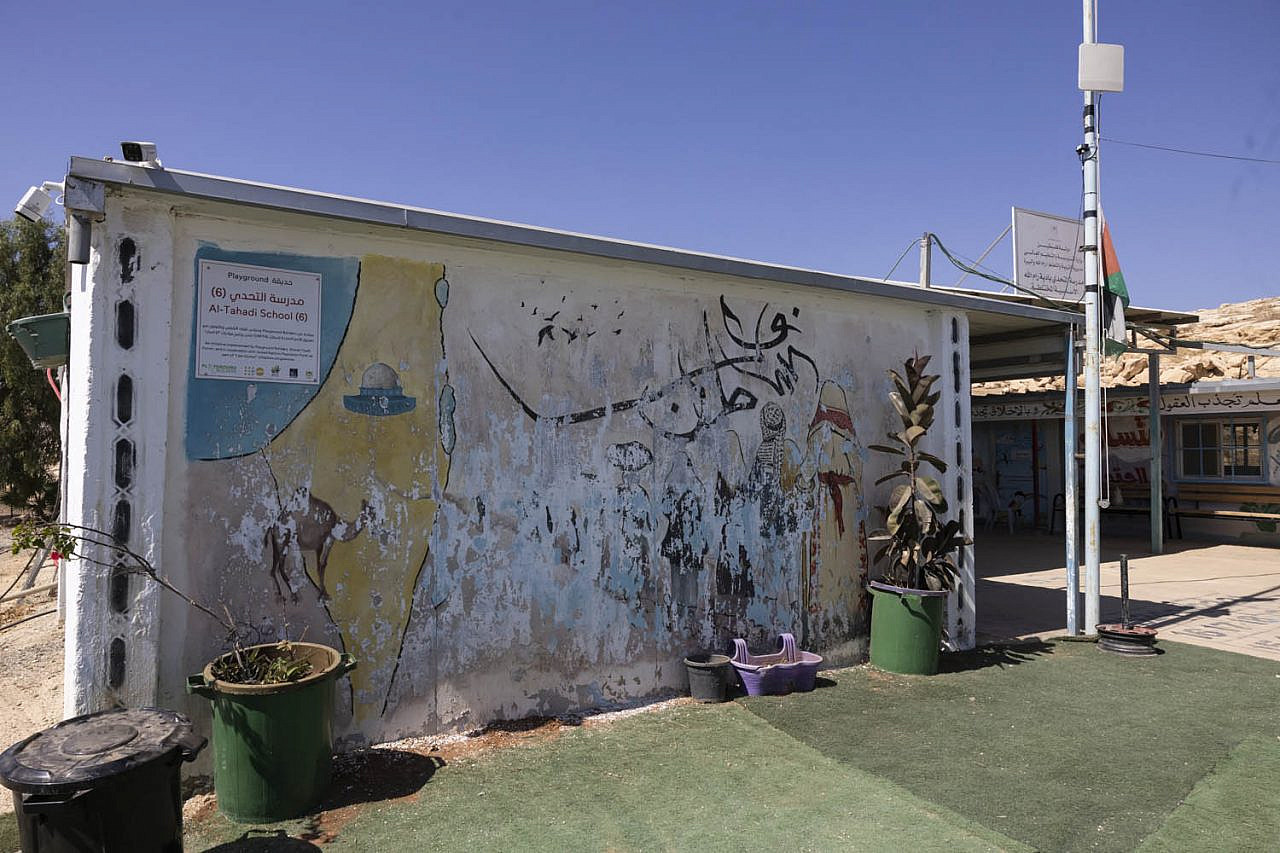
“We were [on that land] for 45 years,” said Abdel Rahman Abu Basher, head of the community. “The settlers came with the army, but it wasn’t ordinary soldiers. All the settlers and the soldiers were masked.” Indeed, the soldiers who raided Wadi al-Siq belong to the Desert Frontier unit, which, as +972 revealed in May, specifically conscripts “hilltop youth” settlers — the very people known for their regular attacks on Palestinians across the West Bank.
“They came in and told us, ‘Go to Gaza or Jordan,’” Abu Basher continued. “They beat us and shot in our direction, including the soldiers. We had to escape; we left behind a lot of equipment.”
Israeli activists appealed to the army and the Civil Administration — the military body that oversees civilian affairs in the West Bank — to accompany the residents back to the village to retrieve the equipment they had left behind. It took five days for the request to be answered, and when the residents arrived at their former village, they discovered that everything apart from the buildings themselves had been stolen. “They took a licensed car that cost NIS 75,000, sheep, a water tank, wheat, olive oil, yogurt, everything,” Abu Basher said.
The settlers and soldiers who raided Wadi al-Siq did not stop at expelling the village’s last remaining residents. According to testimonies collected by +972, and as first published in Haaretz, the soldiers and settlers together kidnapped three Palestinians and several Israeli activists before subjecting them to severe physical abuse, including harsh beatings, burning their skin with cigarettes, and attempted sexual assault.
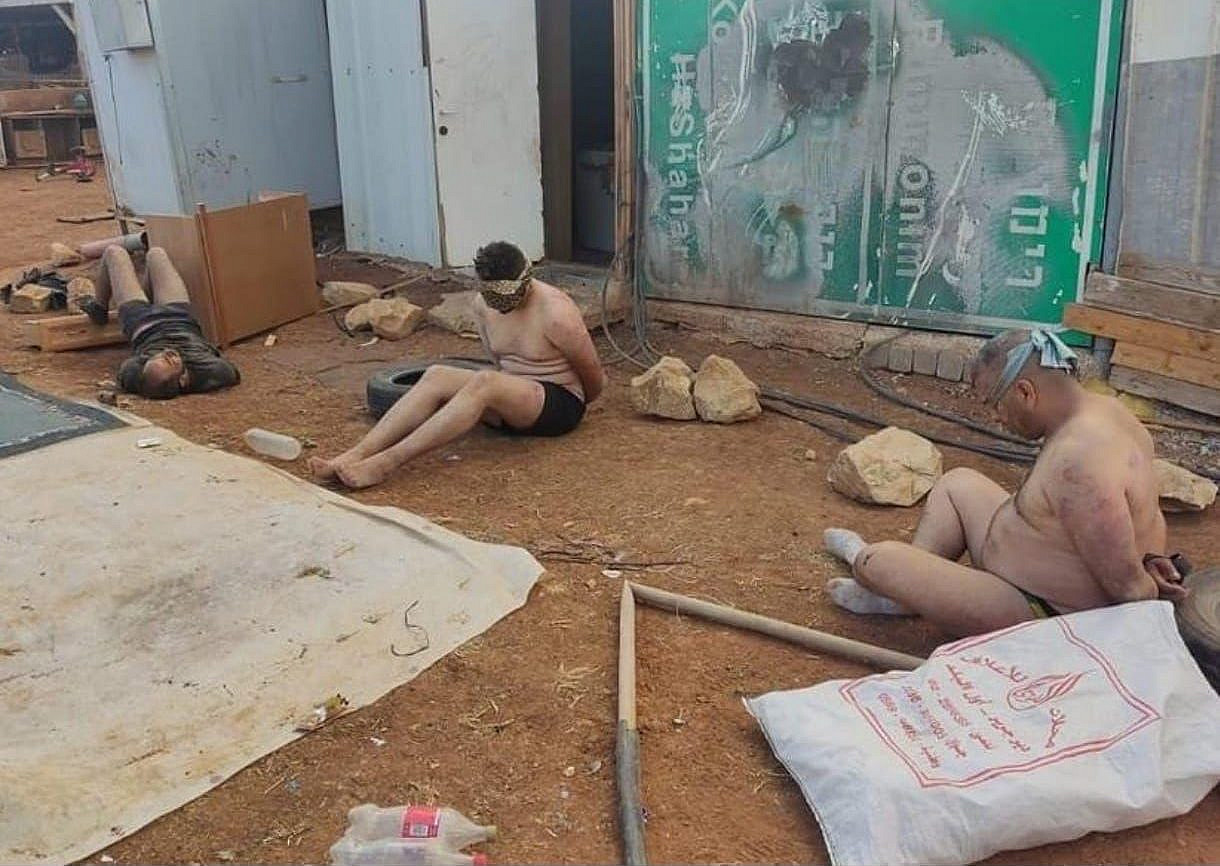
The settlers and soldiers also stole phones, IDs, cash, and a car from the people they kidnapped. The Israelis were released after a few hours, while the Palestinians — two of whom are employees of the Palestinian Authority’s Colonization and Wall Resistance Commission, and the other a resident of the village — were held until late into the evening.
‘It was like Guantanamo’
Mohammad Khaled, 27, and Mohammad Matar (known as Abu Hassan), 46, the two PA employees, had been coming to the village every day over the past few weeks to try, together with other activists, to protect the community. “I was detained by the Shin Bet and the police before, but I never experienced anything like this,” said Abu Hassan, who has been an activist for nearly 30 years, in a choked voice in a call from Ramallah. “What we went through is like Guantanamo; we lost our humanity.”
It began when the pair tried to leave the village to return to Ramallah, and settlers chased them back in. “We gathered our belongings from the tent — a stove, sleeping bags, chairs, vegetables, and all the kitchen utensils — and loaded everything into the car,” he recalled.
“Suddenly, we saw three cars coming our way: the first was the other activists’ car, followed by two Toyota pick-ups loaded with settlers dressed in military uniforms,” Abu Hassan continued. “Our brothers, the activists, tried to stall them so they couldn’t get to us.” It didn’t work: the settlers in the pick-up trucks “attacked us with their guns, ordered us to get on the ground, and started beating and kicking us.”
The settlers then went through all of the belongings in their car, and emptied the bags onto the floor. “One of them took a bag with kitchen utensils and found a vegetable knife, so he said: ‘There, they have a knife.’ I said to him in Hebrew that this is a kitchen knife, but they started beating us again and shouting, ‘You have a knife, you were going to stab,’ and that kind of thing.”
According to Abu Hassan, after nearly an hour, a soldier from the Civil Administration arrived. Abu Hassan asked him if the people who had kidnapped them were soldiers or settlers, and the soldier replied that they were soldiers.
“He took our IDs, checked them, and said, ‘He has a past [conviction],’” Abu Hassan continued. “That was during the [First] Intifada, so I said, ‘That was 30 years ago!’ But when they heard I had a past, they beat me even worse: they hit me on the head with the gun, battered me in the back with sticks, and kicked me in the stomach — me and the men who were with me. The Civil Administration soldier and the two cars with him left the site, leaving us with the settlers.”
‘We thought they were the Shin Bet’
More cars with settlers kept arriving for what Abu Hassan estimates was another two hours. “Each gang that came started beating us up all over again,” he said. At one point, the Palestinians heard them saying that there were Shin Bet officers on their way, and then a car with soldiers arrived.
“One of them approached me, lifted up my head from the ground, and said, ‘Do you remember me?’” Abu Hassan recalled. “I replied, ‘No.’ He said I was a shepherd from Biddya: ‘You were there a few months back and playing tough.’ I said I was not there; I do not work around Salfit, only around Ramallah.
“He started beating me, and saying, ‘You’re lying! You were playing tough back then — let’s see you now,’” Abu Hassan went on. “He kept beating me, then he got a knife and told me to sit. He took the knife and cut our clothes off — our boots, pants, and vests — leaving us only in our underwear. He tied our hands behind our backs with wire.” In a photograph taken by the settlers, the three Palestinian men can be seen blindfolded in their underwear, one of them lying on the ground.
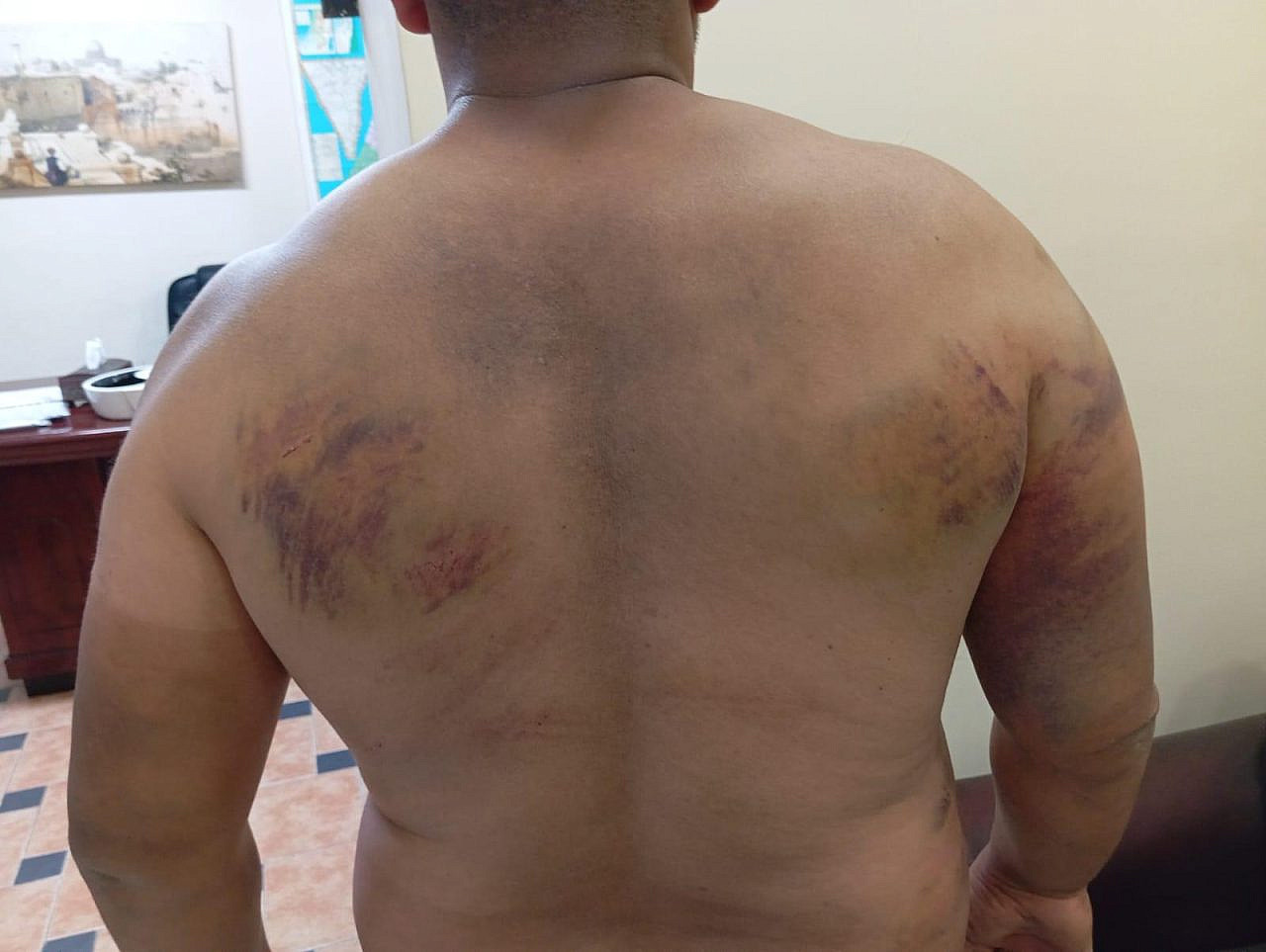
“Then they took us about 200–300 meters away to the edge of the village, to an empty tin shack used as a sheep pen,” Abu Hassan said. “They put our faces to the ground, and started a new phase of interrogation and torture,” which, he estimated, lasted around six hours.
“They were interrogating us, hitting us,” he continued. “And all that time we thought they were the Shin Bet. All the monstrous, inhumane, or immoral means of interrogation you could think of were used against us. You would have thought we were at Guantanamo or Abu Ghraib. They had our hands tied behind our backs, our eyes covered, our faces in the ground, they stepped on our heads and said, ‘Eat! Eat the sheep shit!’
“They jumped on our backs intending to paralyze us, to break the spinal cord,” Abu Hassan went on. “They also tried to hit us on our genitals to mutilate us, 30 to 40 times. They kept taking turns to hit us. [One of the men] brought a stick and started hitting my back over and over. Then he tried to put the stick into my behind. For over a minute he was pressing and pushing, and I was resisting, until I gathered strength and moved him away.
“He got angry and started kicking me and hitting me with the stick until I started to scream and cry; I totally fell apart, so they gave us a break,” he said. “At around 7 p.m. officers from the Civil Administration arrived, came into the pen, and asked what had happened to us. So, we told them the entire story, how they claimed they were from the Shin Bet and that they were interrogating us.” The Shin Bet denied to Haaretz that any of their men were present or involved.
Most read on +972
In response to an inquiry from +972, the IDF Spokesperson stated: “IDF forces arrived at a farm in the Wadi a-Siq area following a report of a number of Palestinian suspects. The forces caught the suspects and after searches found a knife and an ax on them. The manner in which the arrest was carried out and the conduct of the forces in the field was contrary to what was expected of soldiers and commanders in the IDF. The incident is being investigated by commanders and many discrepancies have emerged from it.
“After the initial investigation, a decision was made to dismiss the commander of the unit that carried out the arrest. In the circumstances of the matter and in view of the seriousness of the suspicions, it was decided to open an investigation by the military police. In every incident of friction, the IDF forces are expected to act in order to separate the parties to maintain security and order in the area.”
A version of this article was first published in Hebrew on Local Call. Read it here.


